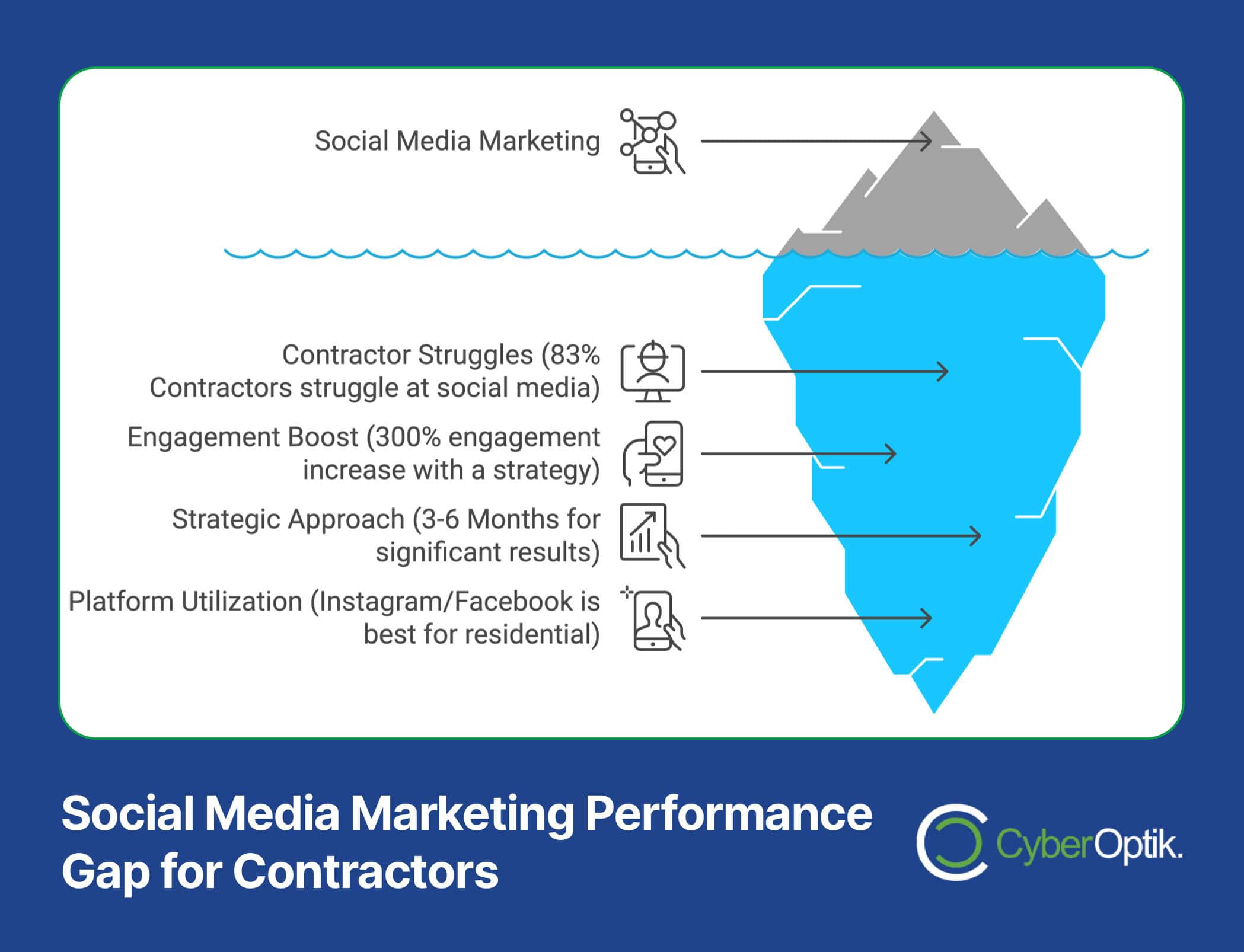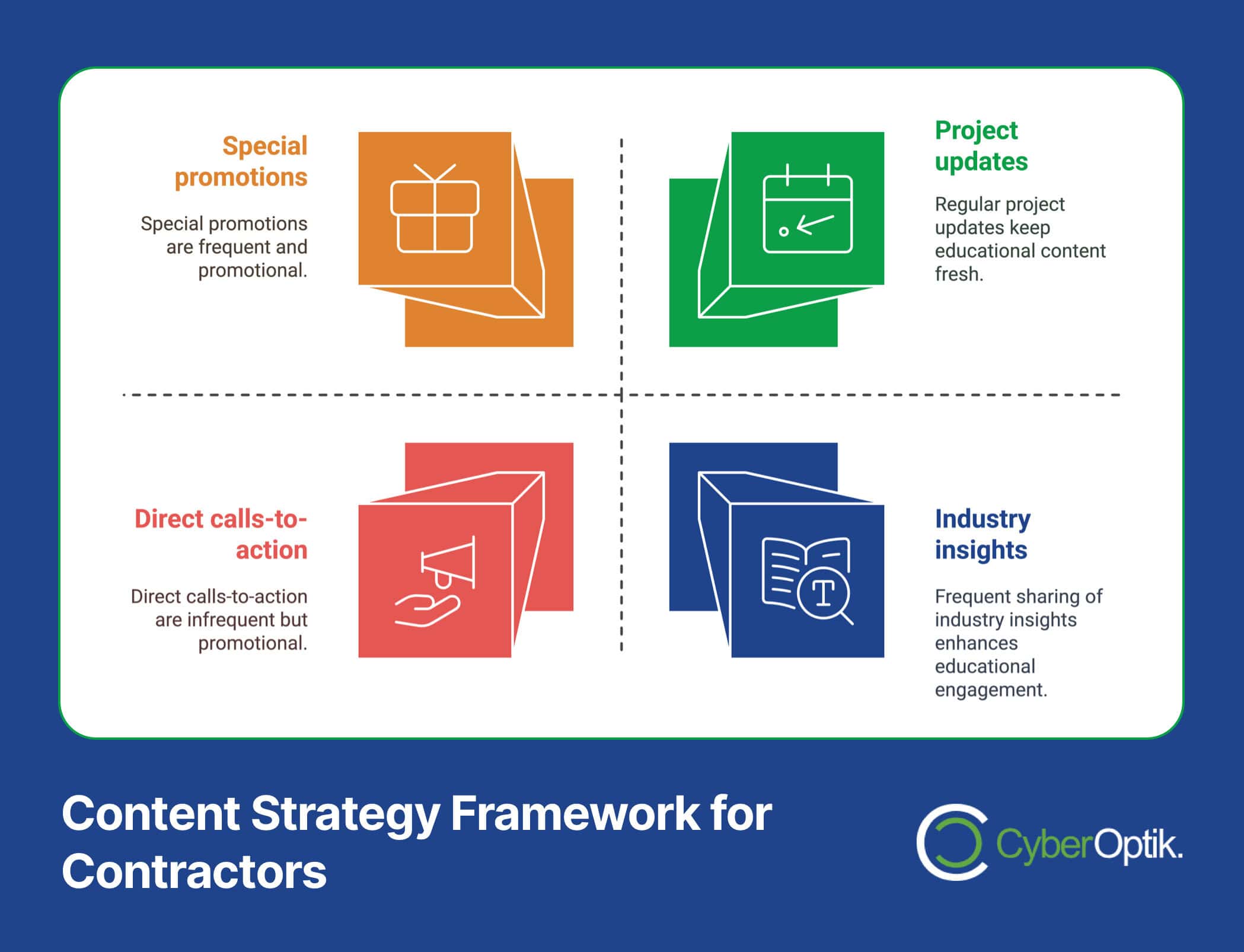Social media marketing success eludes most contractors, with failure rates reaching alarming levels. Our work with Chicago’s construction industry reveals a consistent pattern: contractors struggle with social media posting effectiveness despite investing significant time and resources. The primary reason behind these failures stems from poorly defined marketing strategies.
We’ve discovered through our partnerships with construction companies that social media marketing requires more than occasional posts about completed projects. Success demands a systematic approach combining strategic planning, consistent execution, and proper resource allocation. Our data shows contractors who implement structured social media strategies typically see engagement rates increase by 300% within the first three months.
This guide breaks down the exact reasons behind contractor social media marketing failures and provides our proven framework for turning these challenges into opportunities. We’ll share specific strategies that have helped our clients in the construction industry build strong social media presences that generate qualified leads consistently.
Understanding these challenges represents the first step toward transforming your social media presence from a time-consuming obligation into a powerful lead-generation tool. Our experience shows that contractors who master social media marketing consistently outperform their competitors in lead generation and brand awareness.
The Current State of Contractor Social Media Marketing
Construction companies face unique challenges in social media marketing that set them apart from other industries. Many contractors struggle because they lack the necessary knowledge and experience to effectively manage their social media presence. Our work with Chicago’s construction sector reveals three distinct areas where most contractors encounter difficulties.
Industry-Specific Challenges
The construction industry’s visual nature presents both opportunities and obstacles for social media marketing. While completed projects offer excellent content potential, the day-to-day progress often appears messy or uninteresting to the untrained eye. We’ve found that successful social media ads require a delicate balance between showcasing the process and highlighting the final results.
Construction companies also face unique compliance and safety considerations when creating social media content. Every image or video must meet OSHA guidelines and protect proprietary information, adding layers of complexity to content creation. Our experience shows that contractors who develop clear guidelines for social media content achieve better results while maintaining professional standards.

Impact on Business Growth
Social media’s influence on contractor business growth continues to expand beyond simple brand awareness. Modern buyers research contractors extensively online before making contact. When social media profiles appear inactive or unprofessional, potential clients often move on to competitors without ever making initial contact.
The digital transformation of the construction industry means social media now plays a crucial role in lead generation and client relationships. Contractors who master social media marketing typically see shorter sales cycles and higher quality leads compared to those relying solely on traditional marketing methods.
Common Misconceptions
Many contractors believe social media marketing requires constant attention to phones and computers throughout the workday. This misconception leads to either complete avoidance or inefficient, sporadic posting habits. The reality involves using proper planning and automation tools to maintain an active presence while focusing on core business operations.
Another prevalent myth suggests social media marketing delivers instant results. Our data shows that successful contractor social media campaigns typically require three to six months of consistent effort before generating significant returns. This timeline allows for building audience trust and establishing authority within the local construction community.
Understanding these current challenges and misconceptions provides the foundation for developing effective solutions. The construction industry’s relationship with social media continues to evolve, creating opportunities for contractors who adapt their marketing strategies accordingly. By addressing these fundamental issues, we can begin exploring the specific reasons why most contractors struggle with social media marketing and implement proven solutions for success.
Four Critical Failure Points in Contractor Social Media Marketing
Our analysis of struggling contractor social media campaigns reveals four distinct failure points that consistently undermine success. Understanding these critical issues helps explain why most contractors fail to achieve meaningful results from their social media efforts.
Lack of Strategic Planning
The foundation of successful social media marketing begins with strategic planning, yet many contractors skip this crucial step. Research shows that contractors often fail to define a clear target audience for their social media efforts (Source: WARC). This fundamental oversight leads to unfocused content that fails to resonate with potential clients.
Strategic planning encompasses more than selecting platforms and posting schedules. Our successful clients develop comprehensive strategies that align social media efforts with specific business goals. These strategies include detailed audience personas, content themes, and measurable objectives that guide every post and interaction.
Inconsistent Content Management
Social media success demands consistency, both in posting frequency and content quality. Many contractors fall into a feast-or-famine pattern, posting multiple updates during slow periods followed by weeks of silence during busy seasons. This erratic posting schedule confuses algorithms and audiences alike, reducing organic reach and engagement.
Quality suffers similarly when contractors treat social media as an afterthought. Hastily captured job site photos without context or proper editing fail to showcase the true value of a contractor’s work. Professional social media presence requires the same attention to detail that contractors apply to their construction projects.
Poor Platform Selection
Not every social media platform suits the construction industry’s needs. We frequently encounter contractors spreading themselves too thin across multiple platforms instead of focusing on those that best serve their target market. This approach wastes resources and dilutes the impact of their social media presence.
Platform selection should reflect both audience preferences and content capabilities. Visual platforms like Instagram and Pinterest often work well for showcasing finished projects, while LinkedIn proves valuable for B2B relationships and commercial contracting. Understanding each platform’s strengths allows for more effective resource allocation.
Inadequate Resource Allocation
Successful social media marketing requires proper resource allocation, including time, personnel, and budget. Many contractors underestimate these requirements, attempting to manage their social media presence alongside their daily operational duties. This approach inevitably leads to neglected accounts and missed opportunities.
The most successful contractors in our network either dedicate specific team members to social media management or partner with marketing professionals who understand the construction industry. This commitment ensures consistent, high-quality content creation and engagement with potential clients.
These four failure points create a cascade effect that undermines social media marketing efforts. When contractors address these fundamental issues, they establish a strong foundation for social media success. The next section will outline our proven framework for building an effective social media strategy that overcomes these common challenges.
Building an Effective Social Media Strategy for Contractors

Successful marketing for contractors requires a structured approach to social media. Poor content strategy leads to missed opportunities and wasted resources. Our framework helps contractors develop and implement effective social media strategies that generate measurable results.
Defining Your Target Audience
Strategic audience definition starts with analyzing your most profitable projects and ideal clients. Our Chicago-based contractors find success by focusing on specific market segments rather than trying to appeal to everyone. This targeted approach allows for more relevant content creation and better engagement rates.
Creating detailed audience personas helps guide content creation and platform selection. These personas should include information about decision-makers’ roles, common pain points, and preferred communication channels. Understanding these elements enables more effective messaging and improved conversion rates.
Platform Selection and Optimization
Each social media platform serves different purposes in the contractor marketing ecosystem. Our data shows that most successful contractors focus on two or three platforms that align with their target audience and content capabilities. This focused approach delivers better results than spreading resources across every available platform.
Platform optimization requires understanding each network’s unique features and best practices. For example, Instagram Stories work well for sharing project progress updates, while LinkedIn posts excel at highlighting commercial project completions and industry expertise. Matching content types to platform strengths maximizes engagement and reach.
Content Planning and Creation
Effective content planning balances promotional material with valuable information for your audience. We recommend following the 80/20 rule: 80% educational or engaging content and 20% promotional messages. This ratio helps maintain audience interest while building trust in your expertise.
| Content Type | Purpose | Recommended Frequency |
|---|---|---|
| Project Updates | Showcase Progress | 2-3x per week |
| Educational Content | Demonstrate Expertise | 1-2x per week |
| Client Testimonials | Build Trust | 1x per week |
| Industry News | Show Authority | 1x per week |
Content creation should follow brand guidelines while maintaining authenticity. High-quality images, professional writing, and consistent messaging help establish credibility. Our most successful clients maintain a content calendar that plans posts several weeks in advance, ensuring consistent quality and frequency.
Engagement and Community Building
Social media success extends beyond posting content to actively engaging with your audience. Responding to comments, participating in industry discussions, and sharing relevant content from others helps build an engaged community around your brand. This engagement increases visibility and strengthens relationships with potential clients.
Building a strong contractor brand on social media requires consistent community management. Designating team members responsible for monitoring and responding to social media interactions ensures timely engagement and maintains professional standards in all communications.
A well-executed social media strategy transforms your online presence from a basic marketing tool into a powerful lead generation engine. The next section will detail our implementation framework, providing specific steps to put these strategic elements into action. This practical approach helps contractors move from planning to effective execution.
Implementation Framework That Works
Successful social media management requires a structured implementation approach. Many contractors struggle because social media takes a backseat to immediate operational needs. Our framework provides a systematic method for implementing effective social media marketing while maintaining focus on core business operations.
Setting Up Your Social Media Infrastructure
A solid social media infrastructure starts with properly configured business profiles across your chosen platforms. Professional profile optimization includes complete business information, branded visuals, and consistent contact details. This foundation ensures potential clients can easily verify your business legitimacy and reach out through their preferred channels.
Your social media infrastructure should include documented guidelines for brand voice, visual standards, and response protocols. These guidelines help maintain consistency when multiple team members contribute to social media management. We recommend creating a simple yet comprehensive playbook that covers all essential aspects of your social media presence.
Content Creation and Management Systems
Efficient content creation requires establishing systematic workflows and approval processes. Our most successful contractors develop content banks containing pre-approved images, captions, and hashtags. This preparation enables consistent posting even during busy construction periods.
The content management system should include:
- Content calendar template with posting schedules
- Image and video guidelines for project documentation
- Pre-approved messaging frameworks
- Compliance and safety review checklists
- Emergency response protocols
These systems streamline content creation while maintaining quality standards. Regular content audits help ensure all materials align with your brand guidelines and business objectives.
Automation and Scheduling Tools
Automation tools play a crucial role in maintaining consistent social media presence without consuming excessive time. Strategic automation helps contractors maintain active profiles while focusing on project delivery. The key lies in selecting tools that complement your workflow rather than complicating it.
Proper scheduling ensures your content reaches audiences at optimal times. Our data shows that construction-related content typically performs best during business hours, particularly early mornings when project managers and property owners plan their day. Scheduling tools help maintain this timing consistency without requiring constant attention.
Measuring and Analyzing Performance
Performance measurement begins with establishing clear metrics aligned with your business goals. Basic metrics like follower growth provide surface-level insights, but deeper analytics reveal true business impact. Track engagement rates, lead generation, and conversion metrics to understand your social media ROI.
Regular analysis helps identify successful content types and areas needing improvement. Monthly performance reviews allow for strategic adjustments while maintaining overall direction. This data-driven approach ensures your social media efforts continuously improve and deliver better results.
Implementing these framework elements creates a sustainable social media presence that generates consistent results. The systematic approach allows contractors to maintain professional social media profiles without sacrificing attention to their core business. Next, we’ll examine the specific tools and resources that make this implementation more efficient and effective.
Tools and Resources for Success
Effective digital marketing techniques require the right tools and resources. Failing to leverage automation and AI tools significantly hinders social media optimization efforts. Our experience with successful contractors reveals specific tools that deliver the best results for construction industry social media marketing.
Essential Social Media Management Tools
Professional social media management platforms streamline posting and engagement processes. These tools enable contractors to maintain consistent presence across multiple platforms while saving valuable time. The most effective platforms combine scheduling capabilities with analytics and engagement management features.
We recommend selecting tools based on your specific needs and platform focus. While comprehensive solutions work well for larger operations, smaller contractors might benefit from platform-specific tools that offer deeper functionality for their primary social networks. The key lies in choosing tools that simplify your workflow rather than adding complexity.
Content Creation Resources
Quality content creation requires reliable tools for photo editing, video production, and graphic design. Professional-looking content helps contractors stand out in crowded social media feeds. The right combination of tools enables quick, consistent content creation while maintaining brand standards.
| Tool Category | Primary Use | Key Features Needed |
|---|---|---|
| Photo Editing | Project Documentation | Basic Enhancement, Branding |
| Video Editing | Progress Updates | Trimming, Captions, Branding |
| Graphic Design | Educational Content | Templates, Brand Elements |
| Content Planning | Strategy Execution | Calendar, Collaboration |
These tools should integrate smoothly with your existing workflow. Many contractors find success using mobile apps that allow for quick content creation and editing on job sites. The goal remains creating professional content efficiently without disrupting daily operations.
Analytics and Reporting Platforms
Data-driven decision making requires robust analytics tools. Professional analytics platforms provide deeper insights than native platform analytics, helping contractors understand content performance and audience behavior. These insights guide strategy refinements and resource allocation decisions.
Regular reporting helps track progress toward social media goals. We recommend using tools that automate report generation and highlight key performance indicators. This automation ensures consistent monitoring without excessive time investment.
Recommended Tool Stack
Based on our experience with successful contractors, these essential tools provide the foundation for effective social media marketing:
- Scheduling Platform: Buffer or Hootsuite for multi-platform management
- Photo Editing: Snapseed or Adobe Lightroom Mobile for job site photos
- Video Creation: Canva Video or Adobe Premiere Rush for project updates
- Graphics: Canva Pro or Adobe Express for branded content
- Analytics: Sprout Social or Agorapulse for comprehensive tracking
Selecting and implementing the right tools creates efficiency in your social media operations. The investment in proper tools pays dividends through time savings and improved content quality. When combined with strategic planning and consistent execution, these resources help contractors build and maintain effective social media presence.
With the right tools in place, measuring and analyzing your social media performance becomes crucial for ongoing optimization. The next section will explore how to track success and calculate the true ROI of your social media marketing efforts.
Measuring Success and ROI
Successful social media marketing requires clear performance metrics and ROI tracking. Many contractors struggle because they lack clear goals in their digital marketing strategies. Our approach combines traditional social metrics with contractor-specific KPIs to measure true business impact.
Key Performance Indicators
Effective local SEO and social media success share common measurement principles. While follower counts provide basic visibility metrics, deeper indicators reveal actual business value. Construction companies should focus on engagement rates, lead quality, and conversion metrics that directly impact revenue.
Construction-specific KPIs often differ from standard social media metrics. Project inquiries, estimate requests, and consultation bookings provide more valuable insights than likes or shares. We help contractors track these business-focused metrics alongside traditional social media performance indicators.
Tracking and Analytics
Professional analytics implementation starts with proper tracking setup across all platforms. UTM parameters help identify which social media efforts drive website traffic and lead generation. This detailed tracking enables accurate attribution of leads and conversions to specific social media campaigns.
| Metric Category | What to Measure | Why It Matters |
|---|---|---|
| Engagement | Comments, Saves, Shares | Content Resonance |
| Lead Generation | Form Fills, Calls, Messages | Business Impact |
| Brand Awareness | Reach, Profile Visits, Mentions | Market Presence |
| Conversion | Estimates, Bookings, Projects | Revenue Impact |
Regular analytics reviews reveal patterns in content performance and audience behavior. These insights help contractors optimize their social media strategy for better results. Monthly performance analysis ensures marketing efforts align with business objectives while identifying areas for improvement.
Adjusting Your Strategy
Data-driven strategy adjustments improve social media performance over time. Our most successful contractors review their metrics monthly and make incremental improvements based on performance data. This systematic approach leads to continuously improving results without dramatic strategy shifts.
Strategic adjustments should consider both quantitative metrics and qualitative feedback. Customer comments, direct messages, and sales team insights provide valuable context for performance data. Combining these perspectives enables more effective strategy refinement.
Calculating True ROI
Social media ROI calculation for contractors must account for both direct and indirect benefits. While lead generation provides clear monetary value, brand building and community engagement deliver long-term benefits that affect overall business growth. Our ROI framework helps contractors measure both immediate and long-term impact.
Consider these factors when calculating social media ROI:
- Cost per lead compared to traditional marketing
- Average project value from social media leads
- Time investment in content creation and management
- Tool and resource costs
- Long-term brand value development
Understanding your true social media ROI helps justify resource allocation and guides future investment decisions. Successful contractors use these insights to scale their social media efforts effectively, focusing resources on activities that deliver the best returns.
Measuring and analyzing social media performance provides the insights needed for continuous improvement. This data-driven approach ensures your social media marketing efforts contribute meaningfully to business growth. The following FAQ section addresses common questions about implementing these measurement strategies and maintaining successful social media presence.
Frequently Asked Questions About Contractor Social Media Marketing
Our work with construction companies generates consistent questions about social media marketing implementation. These practical concerns often arise when contractors begin improving their marketing strategies. Competing priorities frequently lead to uncertainty about social media management.
How Much Time Should Contractors Spend on Social Media?
Successful social media management typically requires 5-7 hours per week when properly organized. This time investment includes content creation, scheduling, engagement monitoring, and basic analytics review. Contractors can reduce this time commitment by using automation tools and establishing efficient workflows.
The key lies in working smarter rather than longer. Strategic planning and content batching help minimize daily time requirements while maintaining consistent presence. Many contractors find success by dedicating specific times each week to social media tasks rather than trying to manage them throughout each day.
Which Social Media Platforms Work Best for Contractors?
Platform selection should align with your target audience and content capabilities. Instagram and Facebook typically deliver strong results for residential contractors due to their visual nature and widespread use among homeowners. LinkedIn proves valuable for commercial contractors focusing on B2B relationships.
Success often comes from mastering one or two platforms before expanding to others. This focused approach allows contractors to build strong presence where their ideal clients spend time, rather than spreading resources too thin across multiple platforms.
How Can Contractors Create Engaging Content Consistently?
Content creation becomes manageable through systematic documentation of ongoing projects. Training field teams to capture quality photos and videos during key project stages ensures a steady stream of content. Combining this project documentation with educational content and industry insights creates a balanced content mix.
Developing content themes and templates streamlines the creation process. Many contractors successfully use recurring content series, such as “Project Spotlight Mondays” or “Tip Tuesday” posts, to maintain consistency while simplifying planning.
What ROI Should Contractors Expect from Social Media Marketing?
Social media marketing typically shows measurable results within 3-6 months of consistent implementation. Initial metrics focus on audience growth and engagement, while lead generation metrics become more relevant after establishing platform presence. Most contractors see positive ROI within six months when following strategic approaches.
ROI calculations should consider both direct lead generation and broader brand building benefits. While some contractors generate immediate project inquiries through social media, others find greater value in enhanced brand recognition and referral business.
How Can Contractors Maintain Compliance While Sharing Project Content?
Compliance management starts with clear policies about content sharing. Successful contractors develop guidelines covering client privacy, safety standards, and intellectual property protection. These policies ensure social media content meets professional standards while protecting all stakeholders.
Standard procedures should include obtaining necessary permissions, reviewing content for compliance issues, and maintaining proper documentation. Many contractors incorporate these reviews into their regular quality control processes.
Understanding these common concerns helps contractors develop more effective social media strategies. While challenges exist, systematic approaches and proper planning enable contractors to build valuable social media presence without overwhelming their resources.
The investment in proper social media marketing continues to deliver returns through enhanced brand visibility and consistent lead generation.




